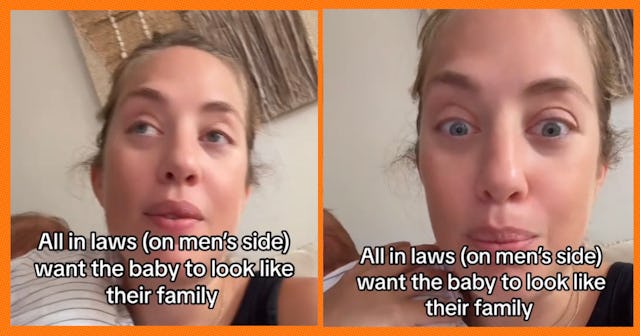New Mom Wonders Why Every Set Of In-Laws Is Obsessed With The Baby Looking Like Their Son
“They try to force it. They try to force the resemblance.”

Once a new baby enters the world, the inevitable conversation about who the baby looks like begins. “Oh, she has her dad’s ears!” “Look at that hair! Just like Pop-Pop!” “Can you believe she has the very same ear lobes as great-grandma Judy?”
The looks comparisons can be exhausting for a new parent who is just trying to get two hours of uninterrupted sleep and avoid chafed nipples, especially when most of that chatter is coming from your in-laws.
One new mom and host of the popular podcast Skinny But Not Fat, Amanda Hirsch, has had enough when it comes to the appearance comparisons about her child (especially when she sees absolutely no resemblance). She has noticed that for her (and several of her girlfriends) it tends to be the men’s side of the family that is obsessed with making sure the baby looks like their son. She wants to know why this is.
“I just want to know if it’s like every dude’s parents that once you have a baby with a dude, the parents, your in-laws, basically want to force the fact that the baby looks like their son,” she says in her viral video.
“So they start making collages on like Day 1 when the baby’s a newborn and doesn’t look like anything. They’re like, ‘Oh my God, Noe looks exactly like him when he was little.’ It’s like, ‘Stop trying to force it.’”
“And I found out, I talked to a lot of people, every man’s parents do this about a baby. I don’t know why. Is it, like, a lineage thing? Is it maybe they don’t feel as connected because, like, the mom is the one that gives birth? ... I don’t know. But ... they try to force it. They try to force the resemblance,” she concluded.
After her video gained traction, several TikTok users resonated with Hirch’s annoyance over this matter, sharing their own instances of in-laws just not being able to read the room.
“My son is my literal twin. EVERYBODY SAYS IT (EVEN HIS FATHER) Except my mother in law. She be like, ‘he looks like our great great great aunt Petunia who died in 1806,’” one user joked.
“Started with the 20 week ultrasound pictures,” another said.
“‘Dimples come from us’ meanwhile me and my dads [sic] side all have dimples ✨,” another joked.
Another shared, “I literally made collages to fight back. 😂”
“Resemblance, personality, food preferences, everything. God forbid my children be a mixture of both of us,” another shared.
While several people agreed with Hirsch, others wanted to share that not all in-laws fit the stereotype.
“My mother in law actually insists the baby looks like me. She is my husband’s twin. I think she is just trying not to be ‘THAT MIL’. She’s an angel,” one mom wrote.
“My MIL said ‘I don’t see my baby, I see yours’ when I asked and I never realized how thoughtful that response was until years later,” another shared.
There is an old wives’ tale basically claiming that newborns tend to be genetically predisposed to appear more like their fathers due to evolution. Back in the cavemen days, babies were more likely to look like their father and therefore more likely to accept the child as his and provide for and care for them. (That’s another story for another day!)
This assumptions was actually disproved by Scientific American and today’s findings on the subject of an offspring’s resemblance to its parents.
However, one research study has found that newborns and kids in general do not look enough like their parents for a resemblance to be detected until when they’re around 12 months old.
A 1995 study from the University of California sought to prove the theory by matching photos of 1-year-old children with pictures of their father. The study asked 122 participants to match photos of children at 1 year, 10 years and 20 years with photos of both their mothers and fathers.
In infants, just under 50% guessed correctly for the fathers, as opposed to around 37% for the mothers. The success rates decreased significantly in 10-year-olds and rose slightly again in 20-year-olds.
However, a 2004 study found that most infants resemble both parents equally.
In concluding the study, co-author and psychologist at the University of Padova in Italy Paola Bressan noted that to the best of her knowledge, “no study has either replicated or supported” the findings from the 1995 study that stated babies resemble their fathers.